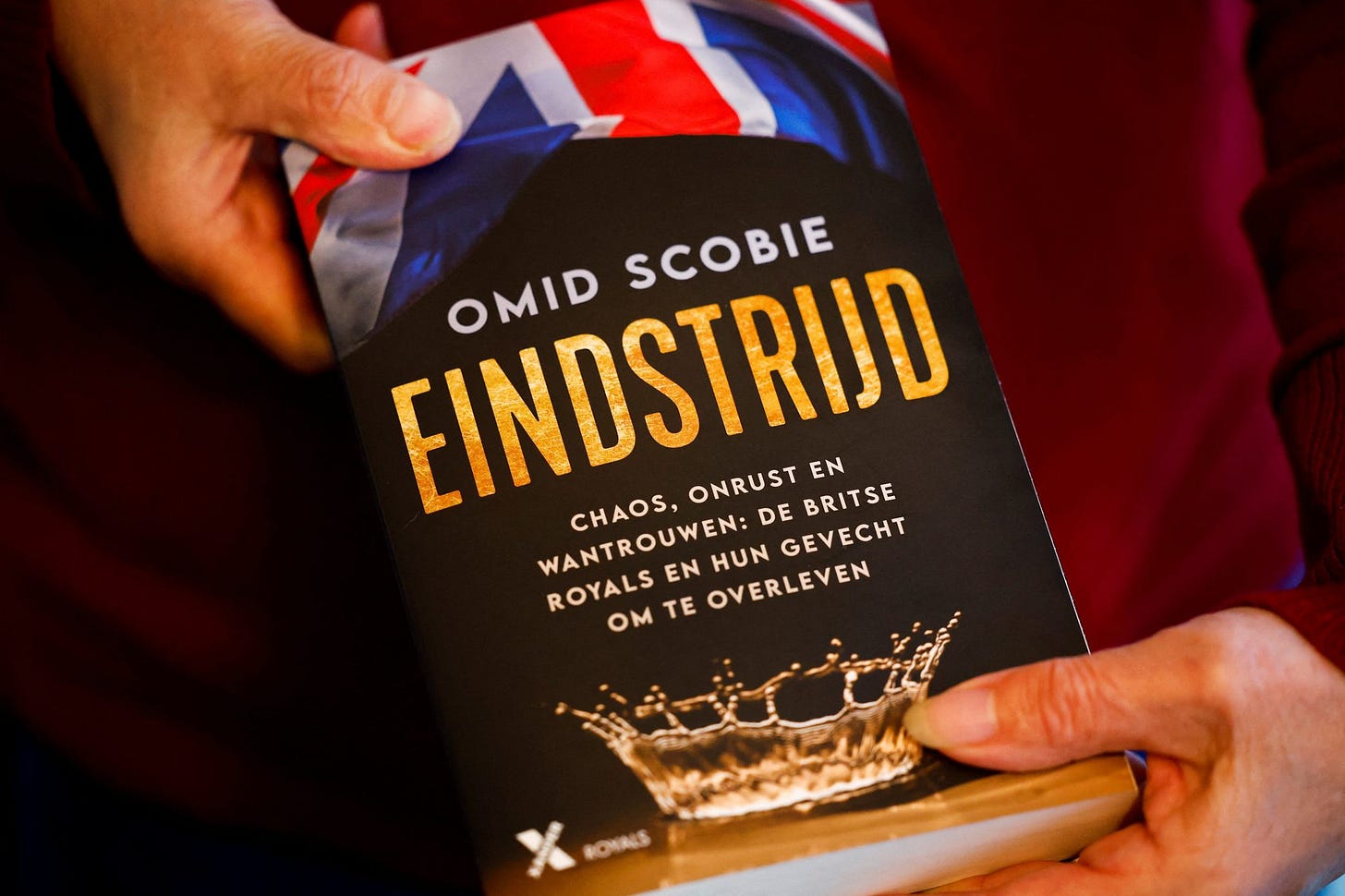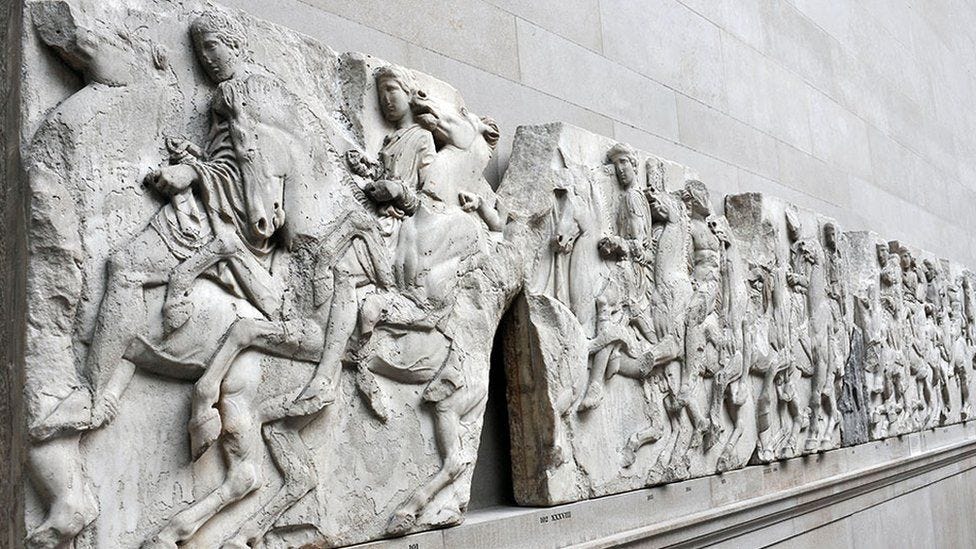Borkowski Media Trends: Royals, Marble Diplomacy & MORE
Infamous Royal book, 'Endgame', the Parthenon Marbles debacle, Tree Paine & Taylor Swift, and Joe Lycett
Found In Translation
Infamous royal correspondent Omid Scobie released his latest book, "Endgame," this week, delving further into the intricacies of the Duke and Duchess of Sussex's experiences within the Royal Family. After a book, biography, podcast, Netflix series and Oprah special, one does wonder how many stones remain unturned. But discussions of that point have been somewhat overshadowed by a surprising turn of events in the Netherlands.
Dutch-language copies of "Endgame" have been swiftly removed from shelves in the Netherlands and Belgium after allegedly naming the senior royal involved in the controversy around the potential skin colour of Meghan's child. Scobie attributes this to a "translation error," but scepticism has arisen, questioning the likelihood of translating names not present in the original English manuscript.
Detractors argue that this may be a deliberate strategy to generate buzz around the book, amplifying sales. Despite Scobie's denial of involvement in the Dutch edition's specific content, questions linger about the nature of the alleged error. However, last night, Scobie swore “on my life, on my family’s life” that the naming was not an orchestrated stunt. He said he was “hurt” by “conspiracy theories that the naming was a publicity stunt”, adding that the row had “overshadowed” the book’s release.
Scobie, often perceived as a close associate of the Sussexes, has faced controversies before, notably with his previous co-authorship of "Finding Freedom." Having been marketed as an 'unofficial biography', it later emerged that Meghan authorised a senior aide to brief Scobie and his co-author. As Hadley Freeman wrote, "Given the deluge of personal minutiae – from Harry’s emoji habit to Meghan’s favourite hair highlight shades – as well as their litigiousness when it comes to undesired invasions of privacy”, the claim that the Duke and Duchess of Sussex were not involved did not seem credible. Scobie has insisted on his journalistic integrity, emphasising his role as an independent reporter covering the royal beat.
Whether by design or accident, this latest drama surrounding the royal family, seemingly dormant for a few months, proves that the narrative is far from over.
Is the UK losing its Marbles?
The age-old debate around the Parthenon Marbles was reignited this week as a diplomatic spat kicked off after the cancellation of a meeting between Rishi Sunak and his Greek counterpart, Kyriakos Mitsotakis. The day before, the Greek Prime Minister had given a BBC interview where he called for the return of the Marbles to Greece, likening it to “cutting the Mona Lisa in half.” Mitsotakis responded to the decision by refusing a backroom meeting with Oliver Dowden – although he did find time to meet Keir Starmer, who supports a temporary loan of the sculptures if agreed by the British Museum.
The questions surrounding the Marbles are effectively art historical in nature, resting on ideas of cultural heritage and the sanctity of the museum as a space. It is perhaps the single issue of art history with which most people are familiar – and, to the presumable disappointment of Rishi Sunak, they mostly disagree with him, with only 15% of respondents to a recent YouGov poll believing the sculptures should remain in the UK. The debate has always been politicised, however, and this latest dispute indicates how culture is inexplicably wrapped up with national identity and patriotism.
Museums, especially national museums, serve as representations of the culture of a nation – when permanent displays are altered or changed, it’s a disruption to a perceived continuity. This is fertile ground for culture warriors. The changes to the Tate Britain’s permanent display in its decennial rehang earlier this year were met with dismay, ironically both by those who felt the silent hand of social history in its curation, and by critics. Returning the Marbles would solve a political and art historical issue, but it would create a chasm in a certain understanding of the British cultural identity, and augur significant change for other museums, driven to alter their collections in the same way.
This is an issue which has no end, not least because it would require a change of law to do so. But it would be a mistake to think of the Marbles as an animating issue for an electorate – for all the airtime devoted to them this week, only 4.1m people a year cross the British Museum’s threshold. Perhaps the most interesting element is that the Museum’s chairman is none other than George Osborne. If David Cameron is, in his capacity as Foreign Secretary, called upon to pick up the pieces, the old band might be back together sooner than we think.
Leafe it to Tree
Some Trends readers might be bemused at the frequency of Taylor Swift’s appearance in these weekly roundups. But Swiftie or not, it is undeniable that the deft handling of her public image is a fascinating case study of celebrity for the ages. Such is Taylor’s infamy in this space that even her publicist, the unforgettably named Tree Paine, has her own type of notoriety.
Historically, Paine has subscribed to the “never complain, never explain” Royal Communications school of PR. However, just as the palace drew its own line in the sand this week by reportedly considering legal action following Piers Morgan’s naming of the so-called “royal racists” (referenced above), Paine has recently chosen to throw her significant weight around. On Thursday, in her first tweet in eight months, Paine called out Deuxmoi (the millennial generation’s primary purveyor of anonymous celebrity gossip) for repeatedly claiming that Taylor and her actor ex, Joe Alwyn, had been secretly married. “Enough is enough with these fabricated lies,” says Paine, not pulling a single punch or risking any contextual watering down that could have occurred if the statement were delivered through traditional means.
Much has already been written about the change in the fame game now that celebrities can talk directly to audiences without the press as a mediator. But it could be argued that Paine’s intervention signals a new era in which the power of PR is moving from behind the curtain to take its place firmly centre stage.
Pooblicity stunt for good
Known for his irreverent humour and headline-grabbing activism, Joe Lycett’s announcement of his ‘new’ podcast, Turdcast, sparked mixed reactions. In it, he planned to interview celebrities about their “poo stories.” Some speculated this was a setup for another public good stunt, while others saw it as his classic brand of comedy.
Lycett began promoting Turdcast by inviting the public to share their worst bathroom stories after using his toilet. However, the project hit a snag when a mechanical failure caused sewage to spill into Liverpool docks from the public toilet, leading to Turdcast’s cancellation.
Or was it? In a twist, Lycett, as his alter-ego ‘Miss Sue Idge,’ revealed on social media that the entire event was a stunt. The aim was to highlight the “billions of litres of real sewage released annually by water companies.” This stunt also brought attention to his upcoming Channel 4 documentary on the UK’s sewage crisis.
Lycett’s brand of prankster activism has been controversial. His past targets, like David Beckham’s Qatar deal, Hugo Boss, and Shell, were largely unaffected by his stunts. His Beckham protest, which involved the “shredding” of £50k (later revealed to be fake), was criticised as wasteful and attention-seeking. While his actions are partly self-promotional, benefiting his upcoming documentary, they also bring critical issues into the limelight.
Lycett’s approach divides opinions. While his ability to generate headlines is undeniably skilful from a PR perspective, its effectiveness in creating lasting change is unclear. However, these stunts resonate because Lycett is an entertainer catering to his audience. As a self-promotion expert, he knows how to stay in the spotlight.









